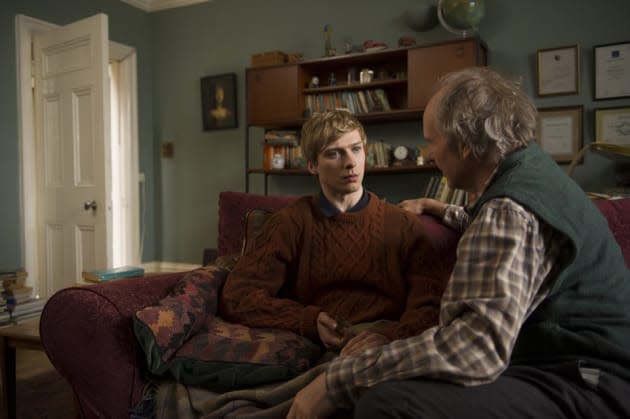AMC's 'Humans' is an android story that's really about us

Early on in AMC's newest sci-fi show, Humans, a teenager wonders aloud if there's any point in going to college and spending years training to be a neurosurgeon. After all, why invest all that time and work when an advanced android, which are commonplace in the show's world, can be programmed with those skills almost instantly. Call it the death of human expertise. Meanwhile, her mother is worried that her family's new "synth" (the show's term for androids) might replace her; her father hopes it can bring her family back together; and her teenaged brother is having sexually confused feelings about their attractive new robot helper. In Humans, the problems of the near future are practically indistinguishable from the issues we're facing today. And that's a big part of why the show works so well.

A co-production between AMC and the UK's Channel 4 (and a remake of the Swedish series Real Humans), Humans is technically set during an "alternate present." It's a world that looks pretty much like ours today, except for the fact that synths are as commonplace as smartphones. While they have a high level of intelligence, synths are basically just domestic servants, taking on the drudgery of things like cleaning, cooking and caretaking so that the real humans can have a break. At least, that's the ideal. In the first two episodes we also see how society is pushing back against synths because they're also replacing people in skilled jobs (something we're already seeing today with machines in factories). And, of course, synths end up in the most human of industries: sex work.
The show covers plenty of familiar sci-fi territory, but the way it juggles those elements feels refreshing. By focusing on the aforementioned Hawkins family, we get a sense of how a normal household might welcome (or not) a robotic alien. When Joe, the patriarch (played by Tom Goodman-Hill), takes his grade-school daughter to pick up their first synth, it's as if he's just perusing the Apple Store to pick up the latest gadget. He settles on an attractive synth named Anita (Gemma Chan), somewhat oblivious to how that could affect his wife Laura (played by Katherine Parkinson of The IT Crowd and The Honourable Woman), a lawyer who seems particularly disturbed by the widespread adoption of synths.

It's not too long before Laura starts to feel threatened by Anita, a perfect-looking synth that can do everything a "good mother and wife" should without ever getting frustrated or tired. Their teenage daughter Mattie, meanwhile, wants nothing to do with Anita and seems to be going through an existential crisis about what synths will mean for her future. While today's generation of college graduates are dealing with crippling debt and an unstable financial market, young adults of tomorrow might have to face a world where their skill set will be practically obsolete by the time they enter the work force.
Once we have robots that look remarkably human in our homes, will we treat them as mere tools or family?
We also get a glimpse at the synth perspective: Anita appears to be a typical domestic android on the surface, but she also has instances where her behavior seems erratic and almost human. There's a group of synths on the verge of achieving true consciousness, and, naturally, there's a shadowy organization trying to round them up and study them. Synths working in brothels get treated just as badly (and likely even worse) as human prostitutes.
Like any good piece of thoughtful science fiction, Humans is strongest when it's saying something about our current society and where we're headed. The issues the Hawkins clan deals with when Anita moves in wouldn't be out of place when a new person enters your home. But we also see how Anita's presence changes the way they live, something show creators Jonathan Brackley and Sam Vincent noticed as we reshaped our lives around smartphones and tablets. William Hurt (who notably played the artificial intelligence inventor in Steven Spielberg's A.I.) plays a scientist who helped bring synths into the world, and yet is having a hard time parting with his malfunctioning synth helper, who also stores memories about his wife. Once we have robots that look remarkably human in our homes, will we treat them as mere tools or family?

Much like Battlestar Galactica before it, Humans works as an allegory about how we all treat each other. We can all agree that slavery is wrong today, but how will we feel once we can easily buy robotic humanoids? And at what point do we start considering their civil rights?
Humans comes at a particularly vibrant time for AI and robots in pop culture. We're far beyond the doomsday Terminator scenarios from the last few decades (yet another reason why the upcoming Terminator: Genisys feels like a film out of place in time). Now, it's as if we're preparing ourselves for the inevitability of true artificial intelligence and robot helpers. Alex Garland's Ex Machina explored how we might end up testing AI, and one of the best episodes of Black Mirror, "Be Right Back," focused on the emotional toll of using AI and androids to recreate our loved ones. We're still facing our fears and anxieties of this new tech through science fiction, but now it's on a much smaller and more intimate scale.
